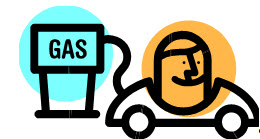The federal gasoline excise tax that helps fund road construction and maintenance has been 18 cents per gallon since 1993! The tax is not tied to the price of gasoline or adjusted for inflation. It requires an act of Congress to increase the tax.
For many years there have been federal and state government studies and ones by think tanks and academics on alternatives to the gasoline excise tax to fund roads, mainly driven by the fact that we drive more fuel efficient cars each year and today many cars run on electricity not gasoline. Since 2008, Congress periodically transfers money from the general fund to the Highway Trust Fund to help it out.
What's the remedy?
While the gasoline excise tax could be increased, that imposes a higher burden on those driving gasoline powered vehicles to fund the roads that are used by others as well. But at least tying the amount to inflation seems to make sense.
Fuel efficient cars and electric cars could be charged an annual registration fee equal to what they would likely pay in excise taxes if instead they drove a typical gasoline burning vehicle.
A road usage fee could be charged, such as a vehicle miles traveled tax (VMT), that has been heavily studied in Oregon and California (and likely elsewhere as well). It is not difficult to track how many miles someone drives and there are ways it can be paid monthly or at least annually when the owner registers their car with their state (with the state sending the tax to the federal government).
On October 18, 2023, the House Transportation & Infrastructure Committee held a hearing on this issue - Running on Empty: The Highway Trust Fund. One of the witnesses was the Oregon Dept. of Transportation Director who had lots of interesting testimony. It included that since 1993 when the current 18 cents per gallon tax was set, inflation on housing has been 306%, 280% on health care and gasoline at 276%.
The Oregon rep also explained road usage charges (RUC) noting that they might also be called VMT or mileage-based user fee (MBUF). Since Oregon has been studying and testing this system for some time, their testimony provides some of this background.
Key takeaways:
- A change is way past due to fund the Highway Trust Fund, or make a decision to get rid of it and fund roads from the General Fund.
- Convert to a RUC and use lessons learned from Oregon's pilot programs in this area.
- Don't keep postponing a fix because we'll continue to have more electric vehicles on the road in the next several years. I recall that around the time when tax reform was being discussed actively in 2011 through 2015 a subgroup of the Senate Finance Committee studied tax and infrastructure issues. They noted that we should move to a VMT and it would take about 10 years lead time to do so. But nothing was started and here was are 10 years later with no change.
What do you think?














